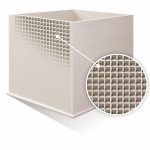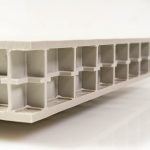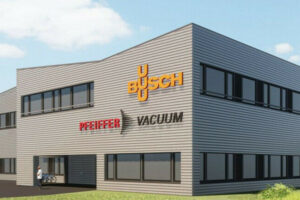Tank builders know that even quite small rectangular tanks for storing chemical media normally require elaborate steel reinforcements. To prevent corrosion, these reinforcements are clad with plastic profiles that first have to be cut to size and welded. The effort entailed in this process can be greatly reduced with Polystone P CubX, which allows rectangular tanks to be built faster and more easily. The sheet material is also suitable for a wide range of applications.
Polystone P (PP) is an isotactic polypropylene characterised by high thermal stability and available in various versions as a homopolymer and copolymer. The plastic is designed in an antistatic, electrically conductive, flame-resistant or UV-stabilised form or with a backing, for instance. PP is a globally proven material for constructing round and rectangular tanks. Being chemically resistant, it is an ideal choice for long-term contact with a wide variety of chemical media.
Unfortunately, conventional sheets require steel reinforcements. Röchling’s newly developed sheets, on the other hand, can reduce the need for steel reinforcement, which greatly speeds up tank construction.
The secret lies in the grid pattern
The special feature is the sheet design, which combines very high longitudinal and transverse stiffness in the sheet itself. Polystone P CubX consists internally of a homogeneous, rectangular (orthogonal) grid pattern, welded to two sheets on the outsides that form the sheet surface. This design results in a construction sheet that combines light weight and ease of handling with very high longitudinal and transverse rigidity. Depending on the size of the tanks, rectangular tanks made of Polystone P CubX require fewer, or even no, plastic-coated steel reinforcements due to the high sheet rigidity. This significantly reduces the number of necessary welds and saves time and resources. Tests in the Röchling materials laboratory, for example, have shown that a Polystone P CubX sheet with a thickness of 57 mm has the same stiffness as a solid 35 mm plastic sheet made from PP despite weighing only half as much. Being lighter, the sheets are easier to handle and lend themselves to repairing and retrofitting chemical process equipment.
Another positive aspect is that Polystone P CubX provides more leak protection than solid plastic sheets. If a leak occurs, the leaking fluid accumulates locally in the sheet interior. That gives the plant operator more time to take appropriate measures. To support leak monitoring, Polystone P CubX sheets come pre-equipped with a recess that forms a cavity in the finished tank for monitoring the interior with a wire, for example. It can also be used as a collecting channel for external optical monitoring.
Last but not least, the hollow chambers in the sheets provide good thermal insulation due to the air trapped inside. That reduces or completely eliminates the need for expensive, time-consuming insulation work.
Online search: cpp0318roechling
Ask the Expert: A very special sheet
An Achema exhibitor is unlikely to be able to come up with a highlight like the Polystone P CubX every three years. How did this development come about? What triggered it?
At Röchling, we have been producing solid sheets of thermoplastic materials with very good chemical resistance for more than 50 years now. One of the disadvantages of solid plastic sheets, however, is their low flexural strength. Rectangular tanks therefore generally have to be reinforced using steel profiles. Experience has shown that this construction method is extremely time-consuming. We therefore wanted to develop a completely new sheet that would help our customers reduce steel reinforcements, saving both time and resources.
How long did it take to develop and how did your engineers go about optimising the complex structure?
We spoke at length with tank builders and analysed the advantages and disadvantages of different variants. Thanks to the good chemical resistance of Polystone P, there was no need to alter the material with additives. We achieved the higher rigidity by changing the geometry. This has resulted in some good news for tank builders: a cross-ribbed, twin-walled sheet that combines high strength with very low weight.
Where do you see the main areas of application in the chemical and petrochemical industry?
Polystone P CubX is particularly suitable for rectangular tanks in electroplating, steel pickling and purification plants as well as in sewage treatment technology and compact clarifiers. Its typical applications include lids and partitions for round tanks, enclosures for ventilation systems and retrofits or repairs for rectangular tanks.
Have any projects been rolled out yet?
Yes, a long-standing customer used Polystone P CubX, for example, when replacing two rinsing tanks in a galvanising plant. They were able to build the new tanks completely without steel profiles, thus saving a lot of time, while the low weight made handling and installation significantly easier.
What economic benefits do you anticipate?
We are convinced that Polystone P CubX will establish itself in the long term as the standard for use in rectangular tank building. Our customers tell us that we have chosen the right approach. Of course, we provide them with intensive technical advice and design support.










